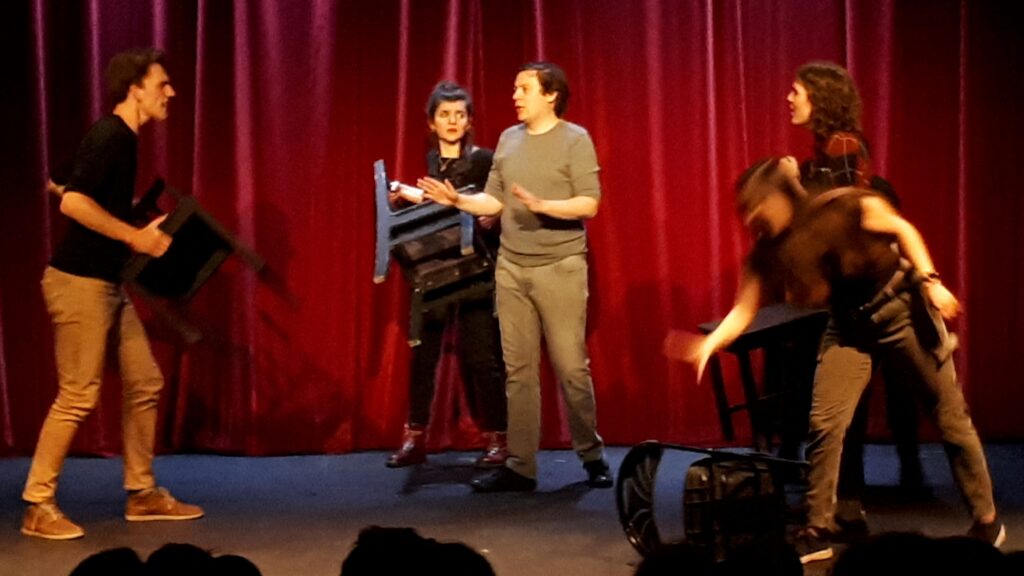Barney Jeff Slater is The Cambridge Impronauts‘ Troupe Director – keeping our skills fresh and spirits high. How does he do it?
Barney, can you tell me about how you came to join the Impronauts? Did you train or perform with other groups first? How did you first learn about us?

I had only done about 4-5 months of Improv workshops with various groups around Cambridge (shout out to The Ministry of Unplanned Occurrences and JSE!) – I loved every second of them. I’d seen a few Impronauts shows and really loved the energy, so I figuratively leapt on the chance when Damian (who I’d met at a few of those workshops) approached me about joining.
I believe it was Whim City and the Quickfires that I saw first, and I thought, “Damn, I want to be a part of that!”
I think that you, like a lot of improvisers, also enjoy role-playing games. For people who don’t play, could you describe what they’re like, and how they’re relevant to performing Improv comedy?
You create this entire universe in your collaborative minds: just project that to an audience and you have an Improv show!
I mean, role-playing games like Dungeons and Dragons are basically just Improv but the audience has been replaced by rolling dice! The basic format is a person in charge (game master or dungeon master) tells you what the situation is, you respond in an appropriate way for your character, then you roll a die to see if it happens how you expect. Then you must respond to that dice result in turn. Eventually, you create this entire universe in your collaborative minds: just project that to an audience and you have an Improv show!
Also if anyone else out there has been the game master with a bunch of creative people, you know that regardless of what you plan they will throw some crazy shit at you that will take you by surprise, and that is where the true ability to improvise helps you respond in an entertaining way. Also, shout out to my DnD group [I’ll allow it – Editor] who now play many Impronauts games when just hanging out!
What would you say to a gamer to persuade them to try Improv? How would you talk an improviser into trying some games?
I think it’s relatively easy because both groups are halfway there already. They just need those gaps filling in. For the improviser, I just need to explain the dice and filling out a character sheet. Even then, if we play and they go off on an immediate tangent then I’ll follow them down there because then we’re having fun, the point of games.
For the gamer, I would just set up a standard DnD game with them, then flip the table, rip up their character sheet, eat their dice and shout “this time we’re just acting it!”
You weren’t with us for long before you became the current Troupe Director. How have you approached the rôle – what are your goals for the Impronauts you’re training?

I knew when the opportunity came up I would go for it, as I’ve done teaching in the past (albeit Biochemistry not acting, but they’re basically the same thing). The Impronauts had given me so much already by including me in our (slightly prophetic it turns out) Improgeddon show in January so I wanted to give something back.
The other Impronauts are all excellent in very unique ways: we have stand-ups, actors, people who make cutting observations on the world and complete surrealists. So my approach has very much been to take a more passive role in directing: I nudge people in certain directions at certain points and lead discussions on creating interesting scenes, characters and stories, but largely I just provide the troupe with challenges and scenarios and watch how they tackle them.

I think my overall goal is to combat the stereotype that comedians can be quite insecure about their talents, which looking at our troupe I can safely say is unfounded. I want them to see how talented they all are, and for the audience to see that too!
Back in March, we were suddenly unable to perform on stage, or in the ADC Theatre Bar, but you stepped up with Clickfire! Tell me about the shows, tech, and rehearsals.
Yeah with the help of the ADC Theatre we managed to very quickly turn our three-per-term Sunday evening show Quickfire! into an online livestream (Clickfire!, there’s a pun in there if you can find it). Using some nice streaming software called Streamyard we could run this online version where we played little games that can be translated to a Zoom call with a live audience giving suggestions on YouTube. There was a nice underlying theme to each show (I got to be the sluglord, slug king and OG slug) and as it was all online there was no need to travel to and from rehearsals and the shows, which was quite nice.

What would be your top 3 tips for bringing Improv to the online world?
We have done workshops with people across the globe, from Russia to India to New Zealand to Brazil!
- Mess with the format! Just because you are all now represented by little boxes on other people’s screens doesn’t mean all your scenes have to be Zoom calls or face to face conversations. Get up and walk around, move the camera to make yourself look really tall/short/upside-down, do that thing with a toilet roll tube where you can make it look like you’re the moon…
Get creative, kids! - Don’t forget to take a break! Sitting in front of a camera in the same position for ages can be really tiring and hurt the creative brain times. So go look at something else briefly between scenes, get a drink, look at a something 3D outside, write your name backwards on your hand, anything to take a quick break and ensure the evil Zoom fatigue doesn’t get you!
- Have a good stream set up for live shows! I cannot emphasise how important it is to have this. There are many free and paid streaming softwares out there like OBS Streamlabs and Streamyard that I highly recommend, and make sure you have ways of interacting with your audience, as that’s the most important part of an improvised show! And if you can, have someone who’s not doing any games (host/compère/director) running the stream- I have tried improvising and running a stream simultaneously, and I looked like an idiot.
You’ve kept the troupe chatting, rehearsing, and performing throughout the summer, Barney. I know we’re all really grateful for that. Once real-life Improv is possible again, what will you miss about the online world? Is there any element of it that will change your approach to the stage?
It’s kept me sane too- nothing helps you remember the days of the week more than knowing you have a workshop every Wednesday to plan!
One thing I’ll definitely miss is the international scope of online activities. We not only have broadcast our show so that anyone anywhere can watch it (great for if your family live on the other side of the world and have never seen you perform before), but we have done workshops with people across the globe, from Russia to India to New Zealand to Brazil! Every person and every culture brings something interesting and new to the scene, and I’ve learned loads from that.

I think one thing I’d like to bring to the 3D stage WATIO (When All This Is Over) is facial expression. I love how facial expressions can be used for comedy, with a timely look being all that’s needed for a laugh, and I think that’s something we’ve all got better at when it’s mainly our heads on show online. Also being able to get through technical difficulties in the middle of a scene – dealing with lighting or stage issues will be nothing compared to disconnecting or lag in a Zoom call!
Pitch me a show idea!
Well my partner and I have had this idea for an improvised game show where the audience provide the names of the rounds and quirks for the contestants and host, but we’ll let you know when we’ve fleshed it out a bit more!
Thanks Barney!
